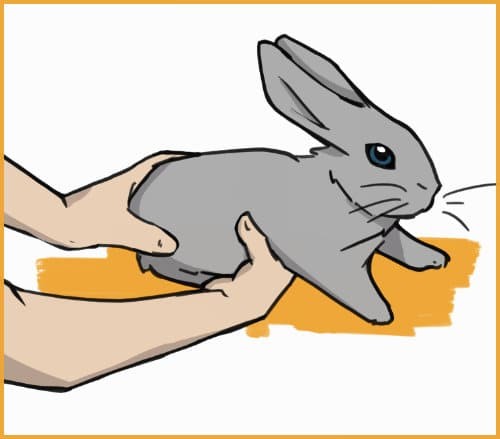Are Rabbits Difficult Pets? At PETS.EDU.VN, we understand you’re seeking a furry friend, and rabbits, with their charming hops and twitching noses, might seem like the perfect fit. However, responsible pet ownership means understanding the full picture. This comprehensive guide explores the realities of rabbit care, helping you determine if a bunny is the right companion for your lifestyle. Discover if rabbit ownership aligns with your capabilities and if you are ready for the rewarding commitment. Learn about rabbit behavior, care requirements, and discover the joy of rabbit companionship.
Table of Contents
- Understanding the Basics of Rabbit Care
- The Allure of Rabbits: Why They Make Great Companions
- The Challenges of Rabbit Ownership: A Realistic Perspective
- Essential Daily Care for Your Rabbit
- Creating the Perfect Rabbit Habitat
- Decoding Rabbit Behavior: Understanding Their Unique Language
- Rabbit-Proofing Your Home: Protecting Your Belongings and Your Bunny
- The Importance of Socialization and Enrichment
- Common Health Concerns in Rabbits and Preventative Care
- The Financial Commitment of Rabbit Ownership
- Adopting vs. Buying a Rabbit: Making an Informed Choice
- Rabbits and Children: A Supervised Relationship
- Finding a Rabbit-Savvy Veterinarian
- Grooming Your Rabbit: Keeping Their Coat Healthy and Shiny
- Travel and Rabbits: Tips for Safe and Stress-Free Journeys
- The Joys of Bonding with Your Rabbit
- Frequently Asked Questions About Rabbit Ownership
- PETS.EDU.VN: Your Partner in Rabbit Care
1. Understanding the Basics of Rabbit Care
Before welcoming a rabbit into your home, it’s essential to understand their fundamental needs. Rabbits are not low-maintenance pets, as commonly believed. They require specific care, attention, and a dedicated caretaker. Understanding their needs and behavior is crucial. A healthy diet, spacious habitat, and regular veterinary check-ups are vital for a happy and healthy bunny.
- Diet: Rabbits need a diet of mostly hay, supplemented with fresh greens and a limited amount of pellets.
- Housing: A spacious cage or pen with a solid bottom is essential, along with daily exercise time outside of their enclosure.
- Veterinary Care: Regular checkups with a rabbit-savvy vet are crucial for preventative care and addressing any health issues promptly.
2. The Allure of Rabbits: Why They Make Great Companions
Rabbits offer a unique charm and companionship that can enrich your life. Their playful antics, soft fur, and affectionate nature make them endearing pets. The joy and satisfaction of caring for these adorable creatures can make rabbit ownership a truly rewarding experience. Their playful behavior and quiet demeanor make them wonderful additions to many homes.
- Quiet Companions: Rabbits are relatively quiet pets, making them suitable for apartment living or homes where noise is a concern.
- Affectionate Bonds: With patience and gentle interaction, rabbits can form strong bonds with their owners, showing affection through licks, nudges, and snuggles.
- Entertaining Personalities: Rabbits possess unique personalities and can be entertaining to watch as they binky, zoom, and explore their surroundings.
3. The Challenges of Rabbit Ownership: A Realistic Perspective
While rabbits offer many joys, it’s essential to acknowledge the challenges of rabbit ownership. Being prepared for these challenges will allow you to be a responsible pet owner. From their chewing habits to their specific dietary needs, being prepared for these challenges will ensure a happy and healthy life for your bunny. Consider these points honestly to assess if you can provide the necessary care.
- Destructive Chewing: Rabbits have a natural instinct to chew, which can lead to damage to furniture, wires, and other household items if precautions are not taken.
- Specific Dietary Needs: Rabbits require a high-fiber diet of mostly hay, supplemented with fresh greens and limited pellets. Maintaining this diet is crucial for their digestive health.
- Veterinary Costs: Rabbit-savvy vets can be more expensive than general practitioners, and emergency care can be costly.
4. Essential Daily Care for Your Rabbit
Providing consistent daily care is crucial for a rabbit’s well-being. Establishing a daily routine is essential for your rabbit’s physical and mental health. Consistent care routines reduce stress and promote a healthy environment. This includes feeding, cleaning, and providing enrichment opportunities. A clean and stimulating environment will contribute to a happy and healthy rabbit.
- Feeding: Provide unlimited access to fresh hay, offer a daily portion of fresh greens, and measure out the appropriate amount of pellets.
- Cleaning: Spot-clean the litter box daily and thoroughly clean the entire enclosure at least once a week.
- Enrichment: Provide toys, tunnels, and opportunities for exercise and exploration to keep your rabbit mentally stimulated.
5. Creating the Perfect Rabbit Habitat
The ideal rabbit habitat should provide ample space for movement, exploration, and relaxation. Creating a stimulating environment for your rabbit promotes good health and reduces boredom. The habitat should be safe, comfortable, and enriching. Consider the size, materials, and accessories when setting up your rabbit’s home.
- Enclosure Size: The enclosure should be at least four times the size of the rabbit when fully stretched out.
- Solid Flooring: Wire-bottom cages can cause sore hocks (inflamed feet), so opt for a solid floor covered with soft bedding.
- Essential Accessories: Include a litter box, hay feeder, food and water bowls, and hiding places within the enclosure.
6. Decoding Rabbit Behavior: Understanding Their Unique Language
Rabbits communicate through a variety of behaviors, including body language, sounds, and scent marking. Understanding these cues can help you better understand your rabbit’s needs and emotions. Observing their behavior can help you identify potential health issues early on. Learning to interpret these behaviors will strengthen your bond with your bunny.
- Binkies: These joyful hops and twists indicate happiness and excitement.
- Thumping: A loud thump of the hind leg can signal fear, anger, or a warning to others.
- Chinning: Rabbits rub their chin on objects to mark them with their scent.
7. Rabbit-Proofing Your Home: Protecting Your Belongings and Your Bunny
Rabbits are natural chewers and explorers, so it’s important to rabbit-proof your home to protect your belongings and ensure your rabbit’s safety. Preventing access to hazards will ensure a safe environment for your curious companion. Consider the following steps to create a bunny-safe environment.
- Cover Wires: Protect electrical cords with plastic tubing or cable protectors to prevent electrocution.
- Protect Furniture: Cover furniture with blankets or sheets to prevent chewing and scratching.
- Block Access: Block access to areas where there are toxic plants, cleaning supplies, or other potential hazards.
8. The Importance of Socialization and Enrichment
Rabbits are social animals that thrive on interaction and mental stimulation. Providing opportunities for socialization and enrichment is crucial for their emotional and mental well-being. Enriching your rabbit’s life can lead to a happier and more well-adjusted pet. This includes interaction with you and a variety of toys.
- Interaction: Spend time interacting with your rabbit daily through petting, grooming, and play.
- Toys: Provide a variety of toys, such as chew toys, tunnels, and puzzle toys, to keep your rabbit entertained.
- Companionship: Consider adopting a second rabbit to provide companionship, but be sure to introduce them properly and monitor their interactions.
9. Common Health Concerns in Rabbits and Preventative Care
Rabbits are prone to certain health issues, so it’s important to be aware of these concerns and take preventative measures. Early detection and treatment are essential for managing these conditions. Consult with a rabbit-savvy veterinarian for guidance on preventative care and treatment options. Recognizing the signs of illness will help you provide prompt care.
- Dental Issues: Rabbits’ teeth continuously grow, so they need access to plenty of hay to grind them down and prevent overgrowth.
- Gastrointestinal Stasis (GI Stasis): This is a potentially life-threatening condition where the digestive system slows down or stops.
- Respiratory Infections: Rabbits are susceptible to respiratory infections, which can be caused by bacteria or viruses.
10. The Financial Commitment of Rabbit Ownership
Owning a rabbit involves ongoing costs, including food, supplies, and veterinary care. Preparing for these expenses will help you provide the best possible care for your bunny. Budgeting for these costs ensures you can meet your rabbit’s needs without financial strain. Consider the following when planning your budget.
- Initial Costs: These include the purchase of the enclosure, litter box, food and water bowls, and other essential supplies.
- Ongoing Costs: These include food, litter, toys, and routine veterinary care.
- Unexpected Costs: Be prepared for unexpected veterinary bills due to illness or injury.
11. Adopting vs. Buying a Rabbit: Making an Informed Choice
When considering rabbit ownership, you have the option of adopting from a rescue organization or buying from a breeder or pet store. Adoption offers many benefits, including saving a life and often getting a rabbit that has already been spayed or neutered. Supporting reputable breeders ensures ethical practices and healthy rabbits. Weigh the pros and cons of each option to make an informed decision.
- Adoption: Consider adopting a rabbit from a local rescue organization or animal shelter.
- Breeders: If you choose to buy from a breeder, research reputable breeders who prioritize the health and well-being of their rabbits.
- Pet Stores: Be cautious when buying from pet stores, as the rabbits may not have been properly cared for or socialized.
12. Rabbits and Children: A Supervised Relationship
Rabbits can be wonderful family pets, but it’s important to supervise interactions between children and rabbits to ensure the safety of both. Teaching children how to handle rabbits gently and respectfully is crucial. Understanding rabbit behavior will help children interact safely and positively. Consider the following guidelines for a harmonious relationship.
- Gentle Handling: Teach children how to handle rabbits gently and avoid squeezing or dropping them.
- Supervision: Always supervise interactions between children and rabbits to prevent accidental injuries.
- Education: Educate children about rabbit behavior and how to recognize signs of stress or discomfort.
13. Finding a Rabbit-Savvy Veterinarian
Not all veterinarians are experienced in treating rabbits, so it’s important to find a vet who specializes in small animals and has experience with rabbit care. A veterinarian experienced with rabbits can provide specialized care. Ensure that your vet is knowledgeable and experienced in rabbit health. This will ensure your rabbit receives the best possible medical care.
- Experience: Look for a veterinarian who has experience treating rabbits and is knowledgeable about their specific health needs.
- Specialized Equipment: A rabbit-savvy vet will have the necessary equipment to properly diagnose and treat rabbits.
- Emergency Care: Find out if the vet offers emergency services or can recommend a nearby emergency clinic that is equipped to handle rabbit emergencies.
14. Grooming Your Rabbit: Keeping Their Coat Healthy and Shiny
Regular grooming is essential for maintaining a rabbit’s coat health and preventing matting and hairballs. Grooming helps to prevent health issues and strengthens your bond. This also reduces the amount of fur shed around your home. Consider the following tips for successful grooming sessions.
- Brushing: Brush your rabbit regularly, especially during shedding season, to remove loose fur.
- Nail Trimming: Trim your rabbit’s nails every few weeks to prevent them from becoming overgrown.
- Ear Cleaning: Check your rabbit’s ears regularly and clean them if necessary.
15. Travel and Rabbits: Tips for Safe and Stress-Free Journeys
Traveling with a rabbit can be stressful for both you and your bunny. Planning ahead and taking precautions can help ensure a safe and stress-free journey. Proper planning can minimize stress and ensure your rabbit’s safety. This includes proper carrier setup and climate control.
- Secure Carrier: Use a secure carrier that is well-ventilated and lined with soft bedding.
- Familiar Items: Include familiar items, such as a favorite toy or blanket, to help your rabbit feel more comfortable.
- Climate Control: Maintain a comfortable temperature in the car and avoid exposing your rabbit to extreme heat or cold.
16. The Joys of Bonding with Your Rabbit
Building a strong bond with your rabbit takes time and patience, but it’s a rewarding experience that can enrich your life. Bonding with your rabbit makes ownership even more enjoyable. The affection and companionship you receive from your bunny are well worth the effort. Consider the following tips for strengthening your relationship.
- Spend Time: Spend time with your rabbit daily, offering gentle petting, grooming, and play.
- Hand-Feeding: Offer treats by hand to build trust and create positive associations.
- Respect Boundaries: Respect your rabbit’s boundaries and avoid forcing interactions.
17. Frequently Asked Questions About Rabbit Ownership
Here are some frequently asked questions about rabbit ownership to help you make an informed decision:
| Question | Answer |
|---|---|
| Are rabbits good pets for beginners? | Rabbits can be good pets, but they require specific care and attention, so it’s important to do your research first. |
| How long do rabbits live? | Pet rabbits typically live for 8-12 years. |
| What do rabbits eat? | Rabbits need a diet of mostly hay, supplemented with fresh greens and a limited amount of pellets. |
| Do rabbits need to be spayed or neutered? | Yes, spaying or neutering is highly recommended for rabbits to prevent reproductive health problems and behavioral issues. |
| How much space do rabbits need? | Rabbits need a spacious enclosure that is at least four times their size when fully stretched out, as well as daily exercise time outside of their enclosure. |
| Are rabbits messy pets? | Rabbits can be litter-trained, but they do require regular cleaning to maintain a clean and healthy environment. |
| Do rabbits like to be held? | Most rabbits do not like to be held, as it triggers their prey animal instincts. |
| How much does it cost to own a rabbit? | The cost of owning a rabbit can vary depending on factors such as food, supplies, and veterinary care, but it can range from a few hundred to several thousand dollars per year. |
| Do rabbits get lonely? | Rabbits are social animals and can get lonely if kept alone, so it’s best to adopt a pair of rabbits or provide plenty of interaction and enrichment. |
| How do I know if my rabbit is sick? | Signs of illness in rabbits can include loss of appetite, lethargy, changes in droppings, and respiratory problems. If you notice any of these signs, consult with a rabbit-savvy veterinarian immediately. |


18. PETS.EDU.VN: Your Partner in Rabbit Care
At PETS.EDU.VN, we are dedicated to providing you with the resources and information you need to be a responsible and informed rabbit owner. As you explore the delightful world of rabbit care, remember that PETS.EDU.VN is here to support you every step of the way. We offer a wealth of articles, guides, and expert advice to help you provide the best possible care for your furry friend.
Do you have questions about rabbit behavior, health, or care? Visit PETS.EDU.VN for in-depth articles and expert advice. We are committed to helping you provide the best possible life for your rabbit. For personalized guidance and support, contact us at 789 Paw Lane, Petville, CA 91234, United States, or reach out via Whatsapp at +1 555-987-6543. Discover the joys of rabbit companionship with PETS.EDU.VN. Our website: pets.edu.vn
